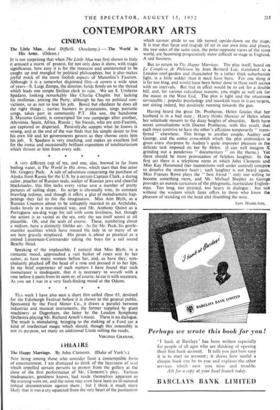I HEA I RE
The Happy Marriage. By John Clements. (Duke of York's.) NOT being among those who consider farce. a contemptible form of entertainment, I am dismayed to think of the heaviness of soul which impelled certain persons to protest from the gallery at the close of the first performance of Mr. Clements's play. Various inadequacies, goodness knows, had made themselves apparent as the evening wore on, and the noise may even have been an ill-natured critical demonstration against them ; but I think it much more likely that it was a cry squeezed from the very heart of the puritanism which cannot abide to see life turned upside-down on the stage. It is true that farce and trardy (if set in our own time and place), the two sides of the same coin, the polar-opposite views of the same world, are becoming progressively more difficult to stage in England. A sad business.
But to return to The Happy Marriage. The play itself, based on Le Complexe de Philemon by Jean Bernard Luc, translated to a London roof-garden and illuminated by a rather thick suburbanish light, is a little sadder than it need have been. For one thing it is far too long, and would have been better done in three swift scenes with no intervals. But that in effect would be to ask for a double bill, and, for various ridiculous reasons, you might as well ask for the moon hi the West End. The plot is tight and the situations serviceable ; popular psychology and mawkish trust in it are targets, not sitting indeed, but positively running towards the gun.
Having heard the great Dr. Protheroe, Helen fancies that her husband is in a bad state ; Henry thinks likewise of Helen when her solicitude mounts to the dizzy heights of absurdity. Both have secret consultations with Doctor Protheroe, with this result, that each must contrive to have the other's affection temporarily" trans- ferred" elsewhere. This brings in another couple, Audrey and George, and the comic cross-stitch which the plot embroiders is given extra sharpness by Audrey's quite improper pleasure in the delicate task imposed on her by Helen. (1 can well imagine X grinding out a ponderous " documentary " on the theme.) Yet there should be more provocation of helpless laughter. In the first act there is a telephone scene in which John Clements and Miss Kay Hammond (her mannerisms well under control) conspire to dissolve the stoniest heart ; such laughter is not heard again. -Miss Frances Rowe plays the "best friend" only too willing to become something more, and Mr. Michael Shepley as Georg* provides an outsize caricature of the phlegmatic, inarticulate English- man. Too long, too strained, too heavy in dialogue : but not without the wisdom which farce offers to those who know the _pleasure of standing on the head and thumbing the nose.
AIN HAMILTON.


























 Previous page
Previous page